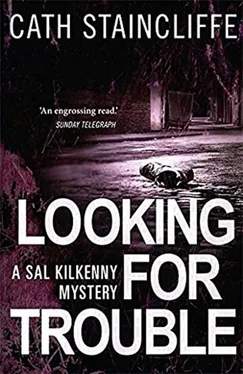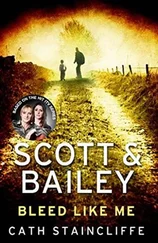
Cath Staincliffe
Looking for Trouble
The first book in the Sal Kilkenny series, 1994
Thank you to all the people who helped me write this book: to Annie who was there from the beginning and shared all the ups and downs along the way; to Mo, who kept telling me I could do it; to Brenda, for great chunks of free child-care; to the novel writers’ group past and present, Ailsa, Christina, Jay, Livi and Maggie for encouragement, support and the pleasure of learning together; and to my children, Daniel and Ellen, for their sweet inspiration.
I get a kick out of following people. There’s a childish excitement in trailing the unwitting suspect, in not being caught doing something shady. It’s rarely easy. Fate conspires to fix the traffic lights, spirit up needy strangers seeking directions, wayward dogs and road-works. Actually, I can’t blame fate for the road-works; that’s down to the city council. They’d only just finished digging up the whole of Manchester, to replace the rotting sewers, when they started digging it up all over again to lay the tram lines.
Of course, in between the thrill of the chase there’s the stifling boredom of waiting. Waiting for the woman to emerge from having her hair permed, for the couple leaving the hotel, together or separately, or for the bloke to finish his stint at the pub.
But that Friday morning back in June, I was lucky. Vernon Wainwright, supposedly off on a business trip to Amsterdam, left the airport ten minutes after his wife dropped him and took a cab to the Trust House Forte hotel in nearby Northenden. There he was joined in the foyer by a young woman. They booked in and took the lift up to their weekend of bliss. The Trust House Forte hotel would hardly be my idea of the perfect setting for a weekend of forbidden passion (couldn’t he at least have taken her to Amsterdam?) but then it’s so long since I had any passion, forbidden or otherwise, that I’m hardly au fait with these matters.
With my adrenalin buzz fading, I drove my old Mini back to face the less than pleasant task of telling Mrs Wainwright that her suspicions were well founded.
I’ve found they usually are. Women know. They spend an inordinate amount of time blaming themselves for being paranoid or insecure, giving hubby the benefit of the doubt just one more time – then, at their wit’s end and fearful for their sanity, they approach someone like me. It’s my job to prove to them that they’re not going loopy.
Mrs Wainwright took the news in her stride. Politely, even. She thanked me for doing the job. I was relieved. I’ve been on the end of a whole heap of anger and bitterness before now. Don’t shoot the messenger.
I sat back and tilted my chair at a dangerous angle. What now? My desk was clear. No work in the pipeline. Should I struggle on as a private eye or launch myself on another career? I’d never actually had a career. I’d had a broad and fairly useless university education, a stint as a desk-potato in a tax office, a baby (now a four year old) and eighteen months as a self-employed investigator. ‘Women returners’ screamed the ads in the local paper, but what had I got to return to? Being re-educated didn’t appeal. And my fantasies of an alternative career ran along the lines of jazz-singer, investigative journalist, film star. None of which featured on the summer school syllabus at what was left of the adult education college.
I sighed, righted my chair and took a turn round my office. It’s a cellar room I rent from a family who live round the corner from my house. Well, not my house – I rent that too. From a brain-drain lecturer who’s over in Australia.
The office looked decidedly jaded eighteen months in. The leak from upstairs the previous winter had left ugly water stains over most of the ceiling. Two corners sported an interesting variety of fungus. Random coffee stains and what looked like bits of old food peppered the walls. I’ve no idea how they got there. I have no recollection of ever throwing food and drink around. Faced with no useful employment and time on my hands, I decided to do something practical. I’d redecorate. There would be paint left over from the kids’ room. Pale lilac. It would be an improvement on what I was looking at.
An hour later, clad in dungarees, I was back in the Dobson’s cellar with step-ladder, roller and tray, paint and dustsheet. I shoved the furniture into the middle of the room, rolled the edges of the carpet in and covered the lot with the dustsheet.
I paint fast and messy. The ceiling was done in twenty minutes and I was speckled lilac like some rare bird’s egg. The phone rang just as I was scraping the excess paint off the roller. I dived under the dust-sheet to find it.
‘Hello.’
‘Is that Sal Kilkenny?’ The woman’s voice was soft, a glottal Bolton accent.
‘Speaking.’
‘I got your name from a friend of mine, Audrey Johnson.’
‘Yes.’ I remembered Audrey Johnson. She’d been less than civil when I’d told her what Mr Johnson was up to.
‘Could I come and see you…if you’re able…you see…oh…’ She was floundering.
‘Yes, of course.’ I tried to put her at her ease, sounding confident and reassuring. ‘When would be convenient?’
‘Well…now. You see, I’m in town, I thought…’
‘Fine.’ I was getting horribly hot under the dustsheet and why not seize the moment? ‘The office is in a bit of a mess,’ I apologised, ‘but I’m sure we can manage.’ I gave her my address and directions from the city centre.
I ran round like a blue-arsed fly, clearing up and replacing furniture. I left the door ajar to let some of the overpowering ammonia fumes escape. I hadn’t time to go and change my clothes. I managed to get most of the lilac spots off my face but my hair bore witness. Hopefully, Mrs Forgot-to-ask-her-name would be more concerned with the business in hand than my appearance.
The bell rang. I clattered upstairs. I might have been lucky with Vernon Wainwright but all that was about to change. It was a Friday in June. Given what I know now, it should have been Friday 13th. It wasn’t but it should have been.
She was a plump woman, middle-aged, average height. Short dark hair streaked with grey. Sallow complexion, broad face, brown eyes. Large eyes. Eyes full of fear. She was dressed conservatively, neat and tidy. Tan skirt and jacket, cream blouse, court shoes. Tiny studs in her ears. No other jewellery, no make-up. We shook hands; hers were clammy. From nerves I guessed.
‘Come on in.’ I closed the door behind her. ‘My office is downstairs. I’m in the middle of re-decorating – that’s the awful smell.’ She followed me down and sat across from my desk.
‘I’m sorry, I didn’t get your name.’
‘Hobbs, Mrs Hobbs.’
‘And how can I help?’
‘It’s my son, Martin. He’s missing. I want you to find him.’ I nodded and began to make notes as we talked.
‘How old is Martin?’
‘Sixteen. It was his birthday at the beginning of June.’
‘How long’s he been gone?’
‘A month now.’
‘And he’s not been in touch at all?’ She shook her head.
‘Has he ever done this before?’
‘No.’
‘Any idea why he’s left?’
‘No, that’s why I’m so worried.’ She twisted the straps of her handbag round her fingers. ‘He’d just gone one morning.’
‘Did he take anything with him? Clothes, money?’
Читать дальше













